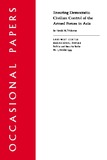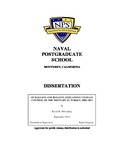Ensuring Democratic Civilian Control of the Armed Forces in Asia
| dc.contributor.author | Trinkunas, Harold A. | |
| dc.date.accessioned | 2014-08-22T23:10:21Z | |
| dc.date.available | 2014-08-22T23:10:21Z | |
| dc.date.issued | 1999-10 | |
| dc.identifier.uri | https://hdl.handle.net/10945/43091 | |
| dc.description | East-West Center Occasional Papers | en_US |
| dc.description.abstract | Even though there is a trend toward political liberalization and democratization across Asia, its emerging democracies will not become consolidated unless elected officials establish authority over their armed forces. While direct military rule has become rare in Asia, military forces continue to impose limits on the scope of democratization efforts in many countries. This paper argues that civilian control exists when government officials hold ultimate jurisdiction over military activities, and that control is maximized when soldiers are confined to tasks linked to their primary function: preparing for war. Civilian control is likely to emerge only when rulers gain sufficient leverage over the armed forces to compel military officers to accept oversight. Only when civilian control is institutionalized will democracy prevail and norms of civilian supremacy develop within the military. | en_US |
| dc.rights | This publication is a work of the U.S. Government as defined in Title 17, United States Code, Section 101. Copyright protection is not available for this work in the United States. | en_US |
| dc.title | Ensuring Democratic Civilian Control of the Armed Forces in Asia | en_US |
| dc.type | Article | en_US |
| dc.contributor.department | National Security Affairs |





